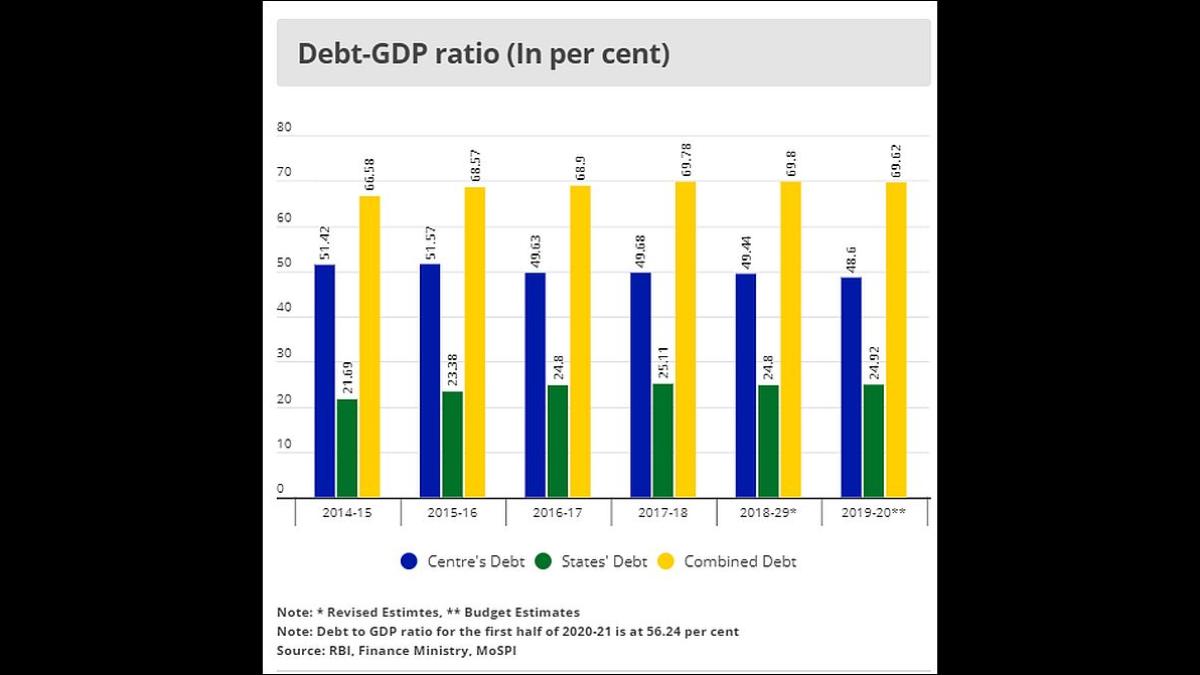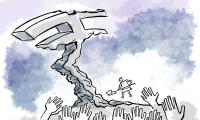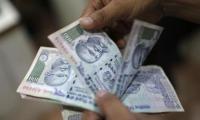India's Credit Profile Unchanged: Fitch on Fiscal Deficit Reduction
Fitch Ratings says faster fiscal deficit reduction in India doesn't significantly alter its sovereign credit profile, but emphasis on deficit reduction will stabilize debt-to-GDP ratio over the medium term.

Illustration: Uttam Ghosh/Rediff.com
New Delhi, Feb 2 (PTI) Fitch Ratings on Friday said the slightly faster pace of fiscal deficit reduction does not significantly change India's sovereign credit profile but the government's emphasis on deficit reduction will help to stabilise the debt-to-GDP ratio over the medium term.
In a post budget commentary, Fitch Ratings Director, Sovereign Ratings, Jeremy Zook said over the next five years, India's government debt-to-GDP ratio would be broadly stable at just above 80 per cent of GDP. This is based on a continued path of gradual deficit reduction, as well as robust nominal growth of around 10.5 per cent of GDP.
In the interim Budget 2024-25, presented in Parliament on Thursday, the government revised lower its current year fiscal deficit to 5.8 per cent from 5.9 per cent budgeted earlier.
The deficit, which is the gap between the government's revenue and expenditure, will come down to 5.1 per cent in 2024-25 and further to 4.5 per cent by 2025-26.
Fitch said this demonstrates a firm desire to adhere to a path of gradual fiscal consolidation even amid an election year.
"The budget presented on Thursday was broadly in line with our expectations, though with a slightly faster pace of deficit reduction, from when we affirmed India's 'BBB-' rating with a Stable Outlook in January.
"As such, it does not significantly change the sovereign credit profile. India's fiscal deficit and government debt ratio are high relative to peer medians, but the government's emphasis on deficit reduction helps to stabilise the debt ratio over the medium term," Zook said.
This Budget was important in signalling the current government's clear commitment to fiscal consolidation and its capex agenda, should it return to office, he added.
The government had earlier estimated that the fiscal deficit will come down to 5.4 per cent in the next financial year, beginning from April 1, 2024.
However, in the interim Budget, it bettered its estimates to 5.1 per cent of GDP.
"Our current forecast is for the deficit to reach 5.4 per cent of GDP in FY25, above the budget target due to more conservative revenue forecasts in the next year. But the government has shown a recent record of achieving fiscal targets, which gives credibility for it to reach the 5.1 per cent target," Zook said.
Replying to a question in the post-budget conference on her message to rating agencies, Sitharaman said: "Not only aligning with the fiscal consolidation roadmap that we gave earlier, but bettering it -- that is one simple, straight forward message that every rating agency should take on board."
Higher dividends from banks and financial institutions, apart from improvement in tax mobilisation, would help achieve the fiscal deficit glide path.
All three global rating agencies -- Fitch, S&P and Moody's -- have the lowest investment grade rating on India, with a stable outlook. The ratings are looked at by investors as a barometer of the country's creditworthiness and impact borrowing of companies.
On Thursday, Moody's Investors Service had said that the interim budget for 2024-25 firmly conveys the government's commitment to its fiscal consolidation goals, set against a backdrop of healthy economic growth.
The government demonstrated fiscal restraint in not resorting to large handouts or increasing discretionary spending ahead of this year's elections, Moody's Investors Service Senior Vice President Christian de Guzman had said.
In a post budget commentary, Fitch Ratings Director, Sovereign Ratings, Jeremy Zook said over the next five years, India's government debt-to-GDP ratio would be broadly stable at just above 80 per cent of GDP. This is based on a continued path of gradual deficit reduction, as well as robust nominal growth of around 10.5 per cent of GDP.
In the interim Budget 2024-25, presented in Parliament on Thursday, the government revised lower its current year fiscal deficit to 5.8 per cent from 5.9 per cent budgeted earlier.
The deficit, which is the gap between the government's revenue and expenditure, will come down to 5.1 per cent in 2024-25 and further to 4.5 per cent by 2025-26.
Fitch said this demonstrates a firm desire to adhere to a path of gradual fiscal consolidation even amid an election year.
"The budget presented on Thursday was broadly in line with our expectations, though with a slightly faster pace of deficit reduction, from when we affirmed India's 'BBB-' rating with a Stable Outlook in January.
"As such, it does not significantly change the sovereign credit profile. India's fiscal deficit and government debt ratio are high relative to peer medians, but the government's emphasis on deficit reduction helps to stabilise the debt ratio over the medium term," Zook said.
This Budget was important in signalling the current government's clear commitment to fiscal consolidation and its capex agenda, should it return to office, he added.
The government had earlier estimated that the fiscal deficit will come down to 5.4 per cent in the next financial year, beginning from April 1, 2024.
However, in the interim Budget, it bettered its estimates to 5.1 per cent of GDP.
"Our current forecast is for the deficit to reach 5.4 per cent of GDP in FY25, above the budget target due to more conservative revenue forecasts in the next year. But the government has shown a recent record of achieving fiscal targets, which gives credibility for it to reach the 5.1 per cent target," Zook said.
Replying to a question in the post-budget conference on her message to rating agencies, Sitharaman said: "Not only aligning with the fiscal consolidation roadmap that we gave earlier, but bettering it -- that is one simple, straight forward message that every rating agency should take on board."
Higher dividends from banks and financial institutions, apart from improvement in tax mobilisation, would help achieve the fiscal deficit glide path.
All three global rating agencies -- Fitch, S&P and Moody's -- have the lowest investment grade rating on India, with a stable outlook. The ratings are looked at by investors as a barometer of the country's creditworthiness and impact borrowing of companies.
On Thursday, Moody's Investors Service had said that the interim budget for 2024-25 firmly conveys the government's commitment to its fiscal consolidation goals, set against a backdrop of healthy economic growth.
The government demonstrated fiscal restraint in not resorting to large handouts or increasing discretionary spending ahead of this year's elections, Moody's Investors Service Senior Vice President Christian de Guzman had said.
You May Like To Read
TODAY'S MOST TRADED COMPANIES
- Company Name
- Price
- Volume
- Vodafone-Idea-L
- 11.55 ( -0.86)
- 54951393
- AvanceTechnologies
- 1.16 (+ 4.50)
- 30451782
- Mehai-Technology
- 1.65 ( -4.62)
- 27788127
- Sunshine-Capital
- 0.27 ( 0.00)
- 20413852
- Harshil-Agrotech
- 0.59 ( -3.28)
- 18624052





